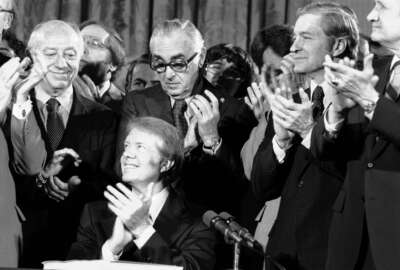Brace for that stack of Trump executive order folders
The second term of President-elect Trump will likely bring changes for the federal workforce tried out in the first term. Telework could be out, Schedule F in!
Worried about Schedule F and the future of your job? Excited to see if DOGE can improve government efficiency? Want to know more about the proposed pick to head up your department? Federal News Network is tracking all things transition-related, as the 47th administration’s plans for the federal workforce take shape. Visit our Tracking the Transition page to keep up with the latest developments.
Remember Day One of the Biden administration? The new president sat at his Oval Office desk, before the cameras and beside a tall stack of executive orders all ready for his signature. Each came bound in a handsome blue folder.
Television reports coming out yesterday said EOs are already under preparation down in Mar-A-Lago.
Many of the 42 orders Biden signed in his first 100 days explicitly reversed orders or policies of the Trump administration. Who said we were never destined to live in strange times. Now President-elect Trump has done only what Grover Cleveland did. Namely, get elected to two non-consecutive terms. The entire 20th century came and went between these two odd phenomena. Cleveland had a stormy tenure as president, especially the second term. Just sayin.’
So brace for it: Donald Trump, when presumably inaugurated, will have his own stack of things to sign. I’m guessing it will be a more like Biden’s stack. That is, well planned long before the ceremonies, and unlike the somewhat ad hoc way Trump seemed to go about things the first time. To quote an old off-Broadway line, Trump’s been burned a bit, and burnished by the sun.
Many of the policy changes, of course, will concern energy, immigration and the environment. They’ll explicitly re-reverse what’s in place how. They’ll produce tension in many agencies.
Some changes will affect the federal workforce across the board. Perhaps obvious, given what we saw in Trump’s earlier term, but here’s what I see as strong possibilities:
- Return to the office. Liberal telework policies will likely give way to strong return-to-the-office policies. Recall that former Social Security Commissioner Andrew Saul, for example, did away with telework.
- Unions. The first Trump administration did away with in-agency office space and furnishings for federal employee unions. It curtailed how much time a union employee could devote to union business. In some cases, people who had been effectively fulltime union workers found themselves having to relearn their original skills for the agency.
- Diversity, equity, and inclusion. The next administration will seek to end training in DEI, preferring to rely on non-discrimination laws and regulations of long standing.
- Schedule F. This gambit started too late in the first Trump administration to take hold. It would have re-rendered policy-connected managerial career jobs as essentially employees at will. They could be fired at will. Bills in Congress to outlaw a Schedule F-type system haven’t passed.
In agencies, no less than workplaces in other sectors, half the employees are thrilled with the election results, half are feeling devastated. For federal agencies, these wide, party-changed oscillations in policy are like corporate takeovers. Employees can’t control who’s in charge at the top, or even who the next line supervisor will be.
So managerial employees and agency leaders — both career and appointed — now have special obligations. The missions don’t stop, nor do the day-to-day routines.
By coincidence, I heard some great advice on how effective leaders manage through wrenching change. It came from Mac Curtis. No, not the late rockabilly star but rather a legend of federal contracting. Among other things in a decades-long career, he was chairman and CEO of Perspecta.
At a small conference put on by contractor services provider TechnoMile, Curtis had several pieces of advice that seemed particularly pertinent now.
“Drive positivity,” he said. “Don’t worry about what you can’t control.” Leaders who fret about a new owner, a new CEO, or a new President or secretary, breed negativity, Curtis said. That corrodes the organization and invites people to stop thinking about what they’re supposed to be doing.
“Drive the mission,” Curtis said. Understand that people who rooted for Vice President Kamala Harris feel disenfranchised now. Rather than dwell on what you can’t change, remind people of their individual importance to the work of the agency, and steer the focus on that.
“Support your people, and they’ll drive the mission,” Curtis said. He added that s little skepticism can be healthy, but cynicism “is not okay.”
Come January 21st, tax returns will need processing. Social Security payments will need processing. Grant applications still need evaluation. You get the picture.
So if you like public service, maybe love your job, let that, and not the political shifts, be your personal guide. People choose public service not because they want to get rich.
The other day I talked with senior executive Dale Bell. He’s deputy assistant secretary for grants at Health and Human Services. He’s been a career fed for 14 years after working in industry. He’s also a new fellow in the National Academy of Public Administration. We spoke on election day, before anyone knew what would happen.
I asked Bell about the pay differential, and why he’d joined government and stayed so long as to make it a career. He said that in business, you have to worry about the customer and about the company, in addition to taking care of your own growth and development.
In industry “you’re perpetually running around with three different voices in your head,” Bell said. “When you become a fed, what you get is one voice, which is: How do I maximize service and value for the American people?” He added, “That clarity is worth any any difference in cost.”
He called that differential the “passion tax.” Bell said, “When you get a job you love so much, you know you’re okay with not making as much as you could. Well, that’s what public service is.”
Something to keep in mind for when the next wave of turmoil arrives.
Copyright © 2025 Federal News Network. All rights reserved. This website is not intended for users located within the European Economic Area.
Tom Temin is host of the Federal Drive and has been providing insight on federal technology and management issues for more than 30 years.
Follow @tteminWFED







